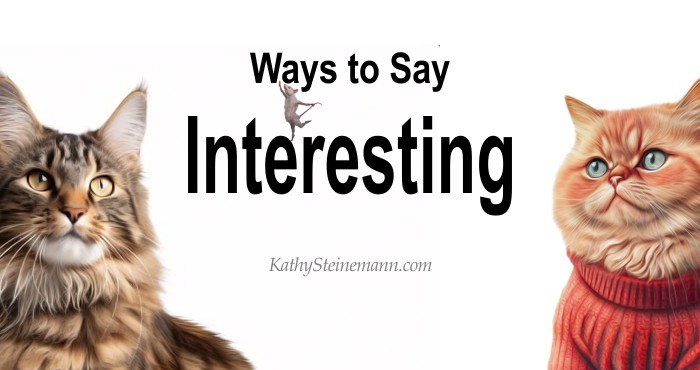
It’s Interesting How Many Writers Overuse Interesting
It might interest you to discover that many writers find excessive repetition of interesting — an uninteresting descriptor — in their WIPs. It might also interest you to try other ways of showing the interestingness of something or someone.
Interesting Emotion Beats and Physical Manifestations
Literary gurus recommend show instead of tell: great advice, but not the best practice for an action scene.
Assuming that your WIP calls for show, you might portray your characters revealing their opinions via ticks like the following.
- fixing one’s eyes on object or person of interest
- declining conversation and asking others to be quiet
- furrowing one’s brow, perhaps accompanying with a smile
- leaning toward object or person of interest
- maintaining direct eye contact while listening
- moving closer to object or person of interest
- occasionally nodding one’s head
- placing a finger on one’s temple
- raising one’s eyebrows
- tilting one’s head
- using the internet to research object or person of interest
- widening one’s eyes
- interrupting one’s activities to focus on object or person of interest
If you need additional beats, consult a body language dictionary or search images.google.com for body language interested. (As an Amazon Associate, I earn from qualifying purchases.)
Interesting Adjectives
Is your protagonist’s speech interesting? or is it attention-grabbing, provocative, or riveting?
How about that stranger on the elevator? Is he interesting? or bizarre, eye-catching, or strange?
Reject lukewarm adjectives. Choose a word that embraces the world you’ve created, a word that paints a vivid picture. For example:
A to E
absorbing, alluring, appealing, arresting, attention-grabbing, beguiling, bewitching, bizarre, captivating, charismatic, charming, compelling, curious, delightful, enchanting, encouraging, engaging, engrossing, entertaining, enthralling, enticing, entrancing, exceptional, exciting, extraordinary, eye-catching
F to O
fascinating, gripping, hypnotizing, important, imposing, impressive, inspiring, intriguing, invigorating, inviting, irresistible, meaningful, mesmerizing, motivating, moving, nice (please find a stronger adjective), notable, noteworthy, out of the ordinary
P to W
perplexing, pleasing, poignant, provocative, remarkable, riveting, significant, spellbinding, stimulating, stirring, strange, striking, tantalizing, tempting, thought-provoking, thrilling, titillating, touching, unusual, welcome, winning
The Writer’s Lexicon series
and additional resources on my Facebook page.
Interesting Similes and Metaphors
Perhaps your writing would be better served with a word or phrase that portrays disinterest. The following figures of speech contain both positive and negative connotations.
- [a book, an essay, a speech] as [engaging, exciting, noteworthy, painful] as [eating paste, a math lesson, a new relationship, sitting through a lecture about _____, watching paint dry]
- a paradox
- an enigma
- a fount of [contradictions, experience, fishermen’s tales, surprises, trivia]
- a new page
- as [appealing, exciting, inviting] as [driving across the prairies, a new _____, an old _____, a secret admirer, waiting for Windows to update]
- as [entertaining, gripping] as [the final quarter of a championship football game, the love life of an amoeba]
- as [enthralling, exciting, thrilling] as [a mother-in-law’s lecture, a roller coaster ride, scuba diving over the Tongue of the Ocean, a skydiving lesson, stepping on Legos]
- as [remarkable, thrilling] as [a bad book review, the discovery of another Harper Lee novel, the invention of _____]
- like an unread thriller
Interesting Nouns
Rather than referring to a character’s interest in something or someone, you could choose a noun such as one of these to replace interest:
A to R
attention, attentiveness, awareness, concentration, concern, consideration, curiosity, focus, imagination, inquisitiveness, nosiness, notice, perception, regard
Interesting Props
Well-chosen props augment a story by sparking new twists or subplots. Exploiting the list of props that follow, we might develop ideas like these:
A character who is accustomed to working in a small town is posted to a large city. Besides being interesting, how else could the character typify the experience? What challenges might the new job present?
Riding a Segway for the first time would be interesting, yes, but it could provide ample opportunity for humor, especially if a character wears glasses, for example, and loses them in the middle of the trip.
Most people take comfort in their favorite beverages, foods, and personal care products. Disrupt their comfort, and you create circumstances that, beyond being interesting, could develop into rich subplots. What if a cat burglar steals a victim’s sunscreen, which is actually an experimental cream that turns his skin blue and renders him identifiable in a police lineup?
More ideas:
- a new job posting
- coping with an unexpected [flat tire, visit of a family member]
- discovery of a new [animal, element, planet]
- learning to [cook, crochet, drive, knit, skate, ski]
- a long-distance relationship
- riding a unicycle
- tackling a new language
- trying a new brand of [coffee, makeup, sunscreen, wine]
- trying on [a suit, a wedding dress]
Interesting Clichés and Idioms
English isn’t plagued with many clichés and idioms that include interesting. However, here are a couple you can reword if necessary.
in an interesting condition: expecting, gravid, pregnant, with child
to cut an interesting figure: attract attention, impress, stand out
The Writer’s Lexicon series
and additional resources on my Facebook page.
Discover more from KathySteinemann.com: Free Resources for Writers
Subscribe to get the latest posts sent to your email.

Wow, this is awesome! I write books for my school’s library and now I can describe my characters without saying interesting too much. Thanks!
Thanks for stopping by, Bella!
Thank you for this post. It’s extremely helpful.
Thanks for stopping by, Smitha.
Great post. Thanks. i’m keeping this one!
Thanks, Vivienne!